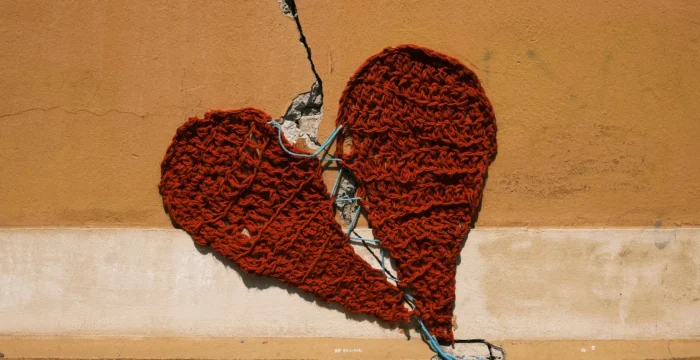Why It’s So Hard to Love Yourself

The way we tend to ourselves and create patterns of care or disdain is far more foundational than we imagine for becoming the next more evolved and impactful version of ourselves.
And while typical ‘self care’ regimens are important, just as (if not more) critical is the way we acknowledge and speak to ourselves. Self-deprecating talk cuts us off from self-love, which keeps us limited in possibility & wholeness.
We become the version of ourselves that we imagine to be true.
The Voices a Child Hears
As a child, I heard many voices.
Some of the voices were kind, gentle, encouraging, and oriented to helping me find my way in the world.
Others of them were harsh, critical and unrelenting in their imposition of constraints.
Both types seeped into my psyche and created the grooves of a split awareness that life was simultaneously worth living, and that I was not loveable.
It wasn’t until decades later, after countless traumas and tragedies had forced my awareness of this catastrophic split, was I able to reconcile and forgive the external voices for this burden on my childhood identity formation.
But even more significantly, I began the long re-pairing and reintegration process of forgiving myself for fragmenting into so many disparate Parts moving in the opposite direction of my deepest soul truth.
Our Split Psyches
Virtually all of my clients show up with similar devastating splits in their psyches.
I should say most everyone I know has these splits.
Only some of us, after painful life events or a desire to become a new version of ourselves, choose to acknowledge and resolve them.
The splits are most often caused by the voices and actions of parents and adult others who intended to shape and mold us into some acceptable version of themselves, rather than help us shape/mold into versions of our own Self.
Most of us grow up in contexts where parents/adults imagine that we’ll be better off if we follow along in their footsteps, conforming to what is believed to be right and true for them.
And when some Part of us seeks to individuate differently than those norms, it is rejected, and it either withdraws or becomes defiant.
And thus the split occurs.
Unfortunately, once our Parts are formed in childhood, these runaway trains of personality form the basis for who we envision ourselves to be and how we are perceived in the world.
Our identity forms around these splits, to which we are mostly unaware of the fragmenting effect.
The Parts and their roles and the tasks they carry out are unseen.
Shadowed.
We create personalities by which we are identified as energetic or lazy, ambitious or apathetic, kind or cruel, inspired or dispassionate, silly or somber, or a million other ‘character’ traits that define us.
We become ‘known’ by these traits, and we come to know ourselves as others perceive us.
Except that the most insidious Part, and the only harm that this process creates, is related to the duration of the Parts, formed in childhood and designed to protect us as best they could when things weren’t safe.
Once a Part, always a Part, until we become aware and reconcile it.
Talking to Ourselves
Thus, we begin to talk to ourselves as the Part(s), as our soul’s amnesia allows us to become that which was expected and is now reliable.
The very constraints imposed in childhood become a noose-like monologue that continues to bind us to the bylaws of our childhood.
Even as we become aware of the constrained identity we have become, and thrash in resistance to the shackled existence, the Parts of us that vowed to protect us dominate our subconscious missives to stay safe in this crazy world.
So we talk to ourselves.
We are not enough. Not ready. Not capable. Not loved. Not loveable as ourselves.
Each of our Parts has a series of extremely nuanced and distinctive core beliefs that it holds true, and keep us safe within a constrained sense of reality.
Each Part knows its job well, and will carry it out at all costs.
Only when we can allow that we are somebody worth loving, can we begin to heal.
Regardless of the Parts and pieces of us in incoherent and brutal conflict with each other, Cupid must allow us to fall in love with each malnourished part.
To value each unpolished gem. To cherish each dissociated gift that comprises our internal collective genius.
Becoming Better Hosts
I often imagine we (each of our whole Selves) are host to a cocktail party of desperate souls, each wanting to be allowed free rein to meander freely among the rooms of the house. Acting out its performance according to its chosen role.
Each part insists it is the most vital guest, the VIP upon which all other guests must focus.
In various moments of our lives, each Part hijacks the mood of the party, demanding that the music and games sway to the rhythms of his needs.
The irony of being the benevolent (or resistant) host is recognizing that we (unconsciously) invited each guest. Each guest indeed has served a VIP role, even if our world no longer needs his services as advertised.
How do we become a better host?
While my children were young, I often threw parties for the families of their sports teams or school clubs, somehow being willing to host the various personalities that surely arrived.
The elaborate care I took to provide a safe space for all to show up and partake of food and drink in celebration of my own (and their) children’s lives perhaps portended for eventual mastery of my own Parts.
If each Part of us fulfilled some important function in childhood, can we not also invite them to minister those transferable skills as a gift for us now?
Like the annoying guest who shows up to repeatedly double-dip the guacamole, we are tenaciously required to address the unnerving behaviors as if they are donations to our unconscious unraveling.
Like all other trauma that “happens” to us, we also benefit from the self-inflicted trauma. We recreate the circumstances to reinforce our Part’s limiting beliefs, create another opportunity to mirror life’s response to our belief system, and once again shine the light on what lives inside us.
We remain oblivious to our culpability until we grow weary of living the same inherent patterns, over and over, and realize our readiness to become the next version of us.
Acknowledging. Allowing. Accepting.
Alchemizing the former Part of us that was hidden and rejected to become an essential part of our wholeness.
A New Narrative
And to acknowledge, allow, accept and alchemize all Parts of us and create coherence in a cohesive ‘whole’ version of us, we must learn a new language.
A reframe of our limiting beliefs into a language of belief in possibility and actuality.
Our Parts generally fall into three camps, as outlined by Richard Schwartz in No Bad Parts (2022) and which I see in virtually every human I interact with:
- The hidden Essential Child, which hosts the most distinct and nuanced elements of your soul, and which may have been required to shut-down its gifts because it was unacceptable to parents or others in your childhood context;
- Protectors, who serve to keep the child locked away until it is safe, which may mean never until you as the adult learn how to protect your child, and
- Firefighters*, who serve as either distractions or radicalized versions of the Essential child, allowing some version of the child to emerge without fear of losing its essence.
*This is in no way a dishonoring of first responders, just a nod to Richard Schwartz’ studied classification schema, which I appreciate and use extensively in my own life and working with clients.
Each Part requires a different communication style, as if we were speaking to three siblings of distinct character in a family.
Any seasoned parent knows that one parenting style won’t work for all her children. In order to truly reach them, she must embrace their uniqueness and respond to their needs and desires with care for what matters to them.
The Protectors are often the simplest Parts to identify and negotiate with. Their roles are often straightforward (create safety, in one form or another,) and can be ferreted out with narrative interviewing about your life story. They often take on a dominant and identifiable role, and sometimes become confused with the primary Self.
Protectors presence themselves in most life circumstances, and are typically the character trait that “identifies” you among a crowd. Protectors don’t always carry swords and shields that keep attackers away (though sometimes they do.) They can also shoulder accommodating, self-effacing, humbling, disconnecting, dissociating and abandoning patterns that keep the child part safe.
In illuminating the role of the Protector, it helps to illuminate its specific and primary roles and tasks in childhood, and to pinpoint how those skills can help you now. (see this story about how my Annihilator Part gave me an ultra-sensitive dose of discernment that now serves me extraordinarily.)
The Firefighter is usually the most intractable of the Parts, as it attempts to distract you from the pain of the hidden Essential Child and often appears violent, incoherent, combative, confused, aggressive, manipulative, or narcissistic. Its role is to create a roadblock to uncovering the hidden Child.
Firefighters are difficult to communicate with, as they often appear irrational and imperturbable in their role of distraction and distortion. And, ironically, firefighters are the least secure of the Parts, and require a long runway to eventually respond to the love, nurture, attention and affection that was likely missing in toddlerhood (and created a repeat of the tantrums of the ‘Terrible Twos’.)
The “lost” Essential Child is the most entrenched of the Parts, and typically requires a dismantling of the Protectors and Firefights to find its way home. The child has hidden behind the protective mechanisms of the other Parts for so long, it seldom trusts that it’s safe to emerge until all Parts have reached consensus (and become at least partially integrated) in a way that no longer overshadows the gifts of the Essential Child.
While navigating the illumination of the Essential Child is tricky work, as the new identity of the Self is also fragile and emerging once the child is uncovered and begins to integrate, it responds to invitations to become playful, evoke wonder and find its child-like way in the world as only a pent-up child can. Once the other Parts have allowed its release from the recesses of the psyche, the Essential Child is virtually unstoppable.
Haven’t you ever seen the flame of aliveness in a child allowed to wander in awe of this most beautiful planet?
So we are seeking this, in each of us, as we liberate ourselves from the constraints of a world war-torn with internal conflict, self-rejection, self-denial and a rarity of self-love.
Becoming Whole Again
As we begin to acknowledge, allow, accept and alchemize the integration of our disparate Parts, we can become the humans that we wish to be.
Much as we may recognize that we can’t find our optimal intimate partner until we become the lover we seek, we also find our way home to ourselves as we tend to our Parts, nourishing them in the love we seek for ourselves.
Belonging to ourselves, so that we may belong more fully in the world
Recent Blog Posts

About The Author
I’m the Author of the bestseller, The Golden Thread: Where to Find Purpose in the Stages of Your Life. Download this free audio course to learn about your own Golden Thread of purpose.
I am a purpose activator and catalyst. I warn people they shouldn’t be near me unless they want to become a new version of themselves. That scares some people, delights others.
I’ve spent my life imagining a world where we could all become who we’re meant to be, awake and alive in a way that allows us to express our most innate, natural and purposeful gifts. I’m the creator and dreamer behind the Purpose Flywheel™.
Stay tuned or contact me to get started now.




